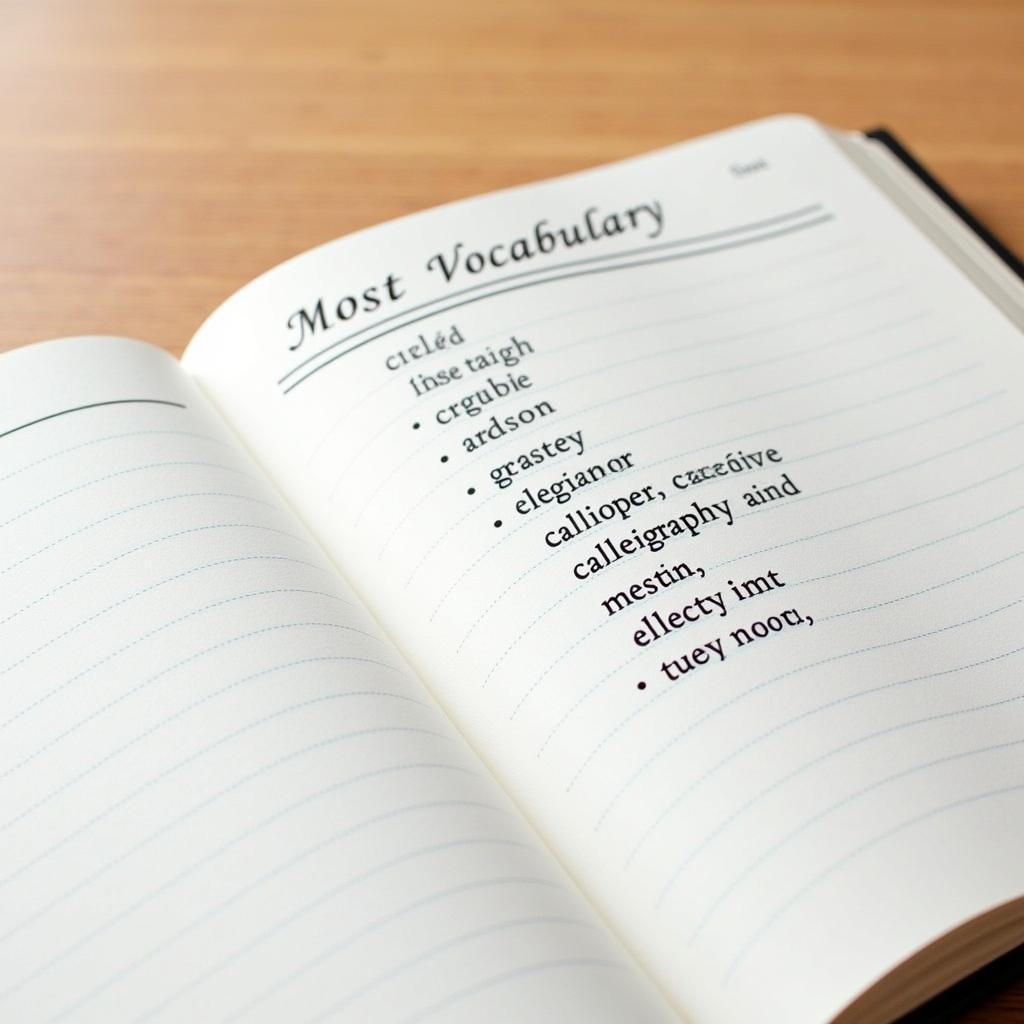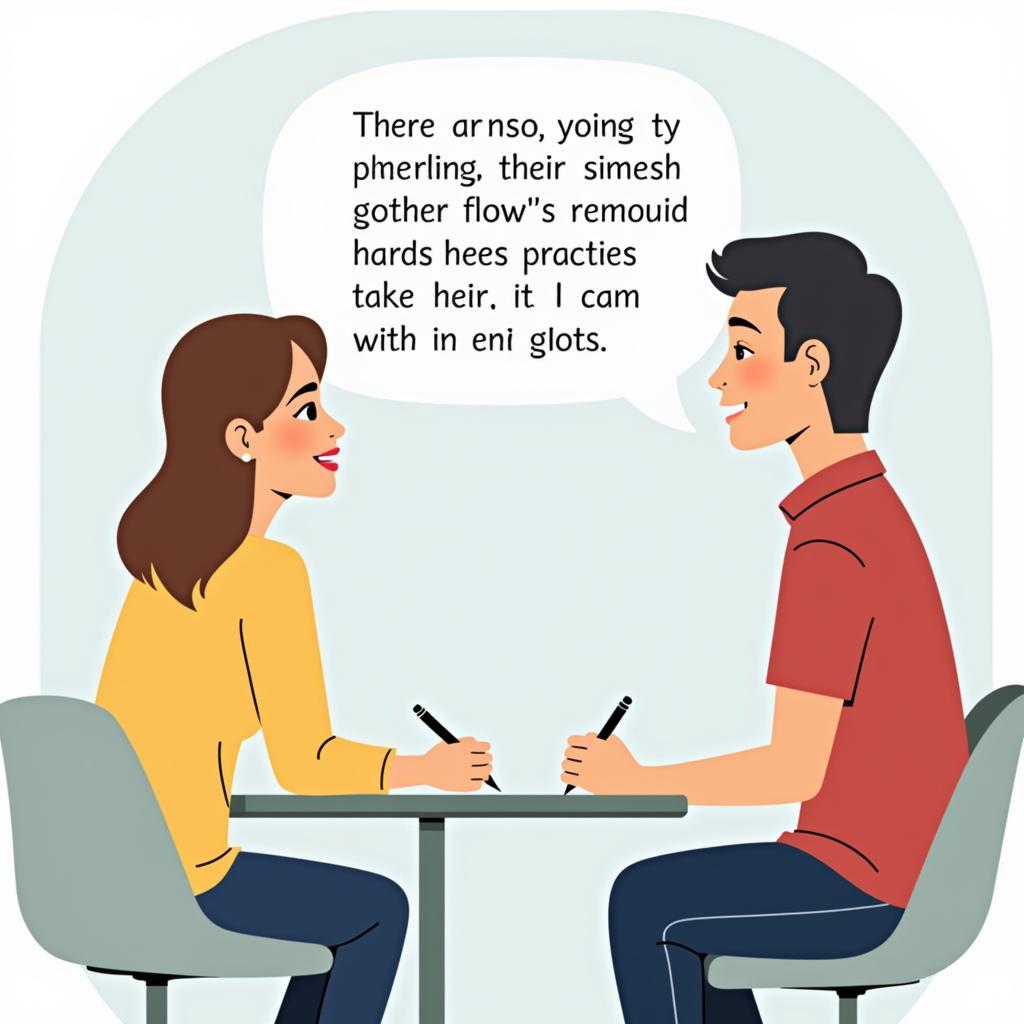Giỏ hàng hiện tại chưa có sản phẩm nào!

IELTS Speaking Part 1: Conquering the Handwriting Topic
Handwriting is a common topic in IELTS Speaking Part 1. This section tests your ability to engage in a natural conversation and express your opinions on familiar topics. Preparing for questions about handwriting can significantly boost your confidence and help you achieve a higher band score. This article will provide valuable insights, sample answers, vocabulary, and tips to help you master the IELTS Speaking Part 1 handwriting topic.
Do you enjoy writing by hand? How often do you write by hand? These are just a few of the questions you might encounter in the IELTS Speaking Part 1 section related to handwriting. Understanding the examiner’s expectations and having a strategy for answering these seemingly simple questions will help you showcase your fluency and vocabulary effectively.
Why is Handwriting Important in IELTS Speaking Part 1?
The handwriting topic is chosen because it’s relatable. Everyone has experience with handwriting, making it easy to generate conversation. It allows the examiner to assess your ability to:
- Use a range of vocabulary: Describe different handwriting styles, tools, and experiences.
- Speak fluently: Answer questions smoothly and naturally without hesitation.
- Express opinions and preferences: Explain your views on handwriting and its importance.
- Use appropriate grammar and pronunciation: Demonstrate your command of the English language.
Common IELTS Speaking Part 1 Questions about Handwriting
Here are some common questions you might be asked about handwriting in the IELTS Speaking Part 1 exam:
- Do you often write things by hand or do you type more?
- Do you think handwriting is still important?
- Do you prefer to write with a pen or a pencil?
- What do you usually write by hand?
- Can you tell me about the handwriting of someone you know?
- Do you think your handwriting has changed over time?
Sample Answers and Vocabulary
Let’s explore some sample answers to these questions, incorporating useful vocabulary and demonstrating different ways to expand your responses.
Question: Do you often write things by hand or do you type more?
Sample Answer 1 (Short and Sweet): I mostly type these days because it’s quicker and more convenient. I only write by hand for things like signing documents or quick notes.
Sample Answer 2 (Expanded): I definitely type more than I write by hand. With computers and smartphones readily available, typing is much more efficient for most tasks, especially longer pieces of writing. However, I still find myself jotting down notes by hand during meetings or lectures.
Vocabulary: jotting down, efficient, readily available.
Question: Do you think handwriting is still important?
Sample Answer 1: I think it’s still important, particularly for learning. I believe writing by hand helps with memory retention.
Sample Answer 2: While typing is dominant in our digital age, I believe handwriting remains relevant. It fosters fine motor skills, improves memory, and adds a personal touch to communication. I believe that the act of physically writing something down helps to solidify it in our minds.
Vocabulary: dominant, relevant, fosters, fine motor skills, solidify.
 IELTS Speaking Part 1 Handwriting Tips
IELTS Speaking Part 1 Handwriting Tips
Question: Do you prefer to write with a pen or a pencil?
Sample Answer 1: I prefer pens. I like the smooth flow of ink and the permanence of the writing.
Sample Answer 2: I’m definitely a pen person. I find pencils a bit messy, and I like the clean lines you get with a good quality pen. I also appreciate the different colors of ink available, which can make note-taking more visually appealing.
Vocabulary: smooth flow, permanence, messy, clean lines, visually appealing.
Tips for Success in IELTS Speaking Part 1: Handwriting
- Practice Regularly: Practice answering various handwriting-related questions aloud. This helps you develop fluency and recall vocabulary quickly.
- Expand Your Answers: Avoid one-word answers. Provide reasons and examples to support your opinions.
- Use a Variety of Vocabulary: Incorporate specific vocabulary related to handwriting, such as “cursive,” “legible,” “calligraphy,” “scribble,” “font,” etc.
- Be Natural and Authentic: Don’t memorize answers. Speak naturally and express your genuine opinions.
- Focus on Pronunciation and Fluency: Clear pronunciation and smooth delivery are crucial for a good score.
 IELTS Speaking Handwriting Vocabulary
IELTS Speaking Handwriting Vocabulary
Handling Unexpected Questions
Sometimes, you might encounter a question you haven’t explicitly prepared for. Don’t panic! Try to relate the question back to your personal experiences and express your thoughts coherently. For instance, if asked about the handwriting of a historical figure, you could say: “While I’ve never seen their original handwriting, I’ve seen reproductions in history books, and it appears quite elegant and formal, reflecting the style of their time.”
Conclusion
Preparing for the IELTS Speaking Part 1 handwriting topic can significantly boost your confidence and performance. By familiarizing yourself with common questions, expanding your vocabulary, and practicing regularly, you can confidently discuss your experiences and opinions on handwriting, helping you achieve your desired band score. Remember, the key is to be natural, fluent, and showcase your language skills effectively. Mastering this seemingly simple topic will lay a strong foundation for the rest of your speaking test.
 IELTS Speaking Practice Handwriting
IELTS Speaking Practice Handwriting
FAQ
-
How long should my answers be in Part 1?
Aim for concise yet informative answers, typically 1-2 sentences for basic questions and 2-3 sentences for questions that require more explanation. -
Is it okay to say “I don’t know” if I don’t understand a question?
It’s better to ask for clarification politely, such as “Could you please rephrase the question?” than to say “I don’t know.” -
Should I memorize answers?
Memorizing answers can sound unnatural. Focus on understanding the topic and developing flexible responses. -
What if my handwriting is bad?
The examiner is assessing your spoken English, not your handwriting. You can even use your handwriting as a talking point! -
Can I use personal anecdotes?
Yes, using personal anecdotes can make your answers more engaging and demonstrate your fluency. -
How can I improve my vocabulary related to handwriting?
Read articles and books about handwriting, pay attention to how handwriting is described, and actively use new words in your practice. -
What if I get nervous during the test?
Take deep breaths and remember to speak slowly and clearly. Practice will build your confidence.
More Resources on XE TẢI VAN
- Learn about IELTS Speaking Part 2: Describing a Vehicle
- Explore opportunities for studying abroad
- Discover career paths in the automotive industry
Khi cần hỗ trợ hãy liên hệ Số Điện Thoại: 0372960696, Email: tuyet.sixt@gmail.com Hoặc đến địa chỉ: 260 Cầu Giấy, Hà Nội. Chúng tôi có đội ngũ chăm sóc khách hàng 24/7.